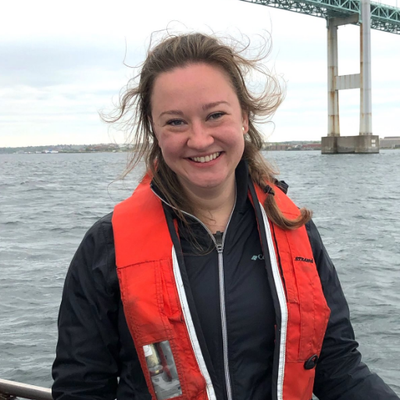
Hi, I’m Alexa Sterling, the Research Coordinator on the SWMS Steering Committee and PhD student at the University of Rhode Island (URI). I’m an officer on the current Steering Committee, and I’m excited to share how I became involved with SWMS – from attending my first SWMS Symposium alone, to starting the URI SWMS Chapter, and now serving on the SWMS Steering Committee. And most importantly, how this group has provided the support, friendship, and inspiration to “just keep SWMSing” to the PhD finish line.
In the first year of grad school, I was forwarded the 2015 SWMS Symposium event announcement with the message “great group, great event.” New to grad school, I didn’t want to miss out on meeting SWMS and learning more about them. But being new to the area meant I didn’t know many people to join me/carpool/be my lunch buddy. So I worked up the courage, signed up last minute, couldn’t figure out how to pay registration, drove to the meeting alone, and sat down in the auditorium nervous but excited. In these early days of science Twitter, I used #SWMS15 to break the ice (@AquaticSterling, give me a 👋). I left that day excited about new connections and inspired by senior women in the field.
I had to bring this SWMS community to my institution, so I found other graduate students who felt the same way and sent listserv emails to survey interest from students and faculty. I received over 50 responses from individuals interested in SWMS at URI, and the first SWMS Chapter was established with a lot of help from students, post-docs, faculty, and staff at URI. We even held our own SWMS Symposium with over 120 attendees just two years later!
I knew I felt an impact from SWMS – I’m more confident speaking my mind, I go to conferences and see SWMS friends, I actively set work boundaries for balance, and I feel inspired to continue on this path in marine science that I know women before me helped clear. I wanted to quantify these impacts, and critically examine how to improve and increase positive impacts. I thought of advice I received at my first SWMS Symposium: “sometimes make opportunities” and that’s how I joined the Steering Committee as Research Coordinator – through a position I helped create. So, we assembled a great research team to create and assess surveys for before and after SWMS Symposiums. You may have even taken one of these – thank you!! We now have responses from three different SWMS Symposiums in three different states. Stay tuned, we’re excited to share the results of these with you!
Alexa

